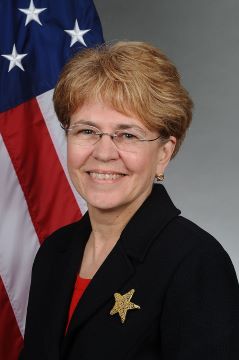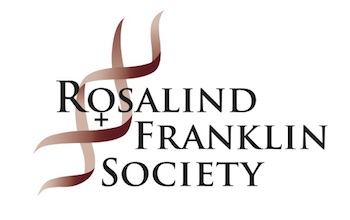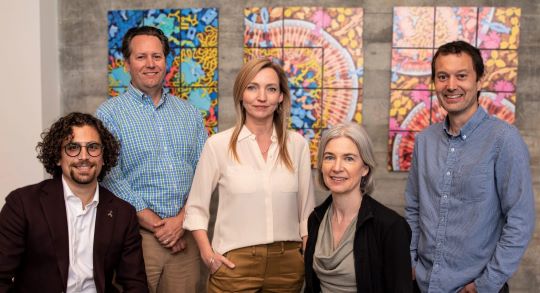Please continue to share important news and opportunities with us so that we may share it with you, and others who are committed to supporting the careers of exceptional women in science.

Dr. Lubchenco is a world-renowned environmental scientist with deep experience in science, academia, and government. Image: Wikipedia.
Recognizing and celebrating the 2021 Vilcek Foundation Prizewinners.
The Vilcek Foundation has launched an online celebration honoring the recipients of the 2021 Vilcek Foundation Prizes. The Vilcek Foundation Prizes recognize the outstanding achievements of immigrants in the arts, sciences, and humanities, and individuals who are champions of immigrant causes in the United States. In 2021, the Vilcek Foundation Prizes are awarded in Biomedical Science, in Filmmaking, and for Excellence in Public Service. Visit the online celebration for videos, insights, and photos that put the spotlight on our 2021 Prizewinners. This year's prizewinners are Ruth Lehmann, Rodrigo Prieto, Andrew Yang, Mohamed Abou Donia, Ibrahim Cissé, Silvi Rouskin, Juan Pablo González, Miko Revereza, and Nanfu Wang. Read more.
MIT Faculty Newsletter Special Edition: Women in Biotech.
This Special Edition of the MIT Faculty Newsletter describes an initiative to address persistent underrepresentation of women faculty as board members and founders of biotech start-ups. Lack of participation at this interface between the university and industry can deprive women faculty and women trainees of professional opportunities and deprive the public of benefitting from discoveries made in women faculty’s labs. Nancy Hopkins, co-founder of the Rosalind Franklin Society, describes the origins of the Boston Biotech Working Group to address the underrepresentation of women faculty as board members and founders of biotech start-ups. Read more.
Call for Proposals (Presentation, Posters, and Sessions) for the 2021 Virtual Public Summit.
The National Academies’ Action Collaborative on Preventing Sexual Harassment in Higher Education is inviting proposal submissions for presentations, posters, and sessions on promising and innovative practices to address and prevent sexual harassment in higher education. Presentations and poster sessions will take place virtually during the 3rd Annual Public Summit, which will be co-hosted by the National Academies and Duke University on October 12-13, 2021. Participation is open to individuals across higher education and those that want to contribute to the discussion around preventing sexual harassment in higher education. Please note that space to present work is limited, and the deadline to submit a proposal for a presentation, poster, or session is Friday, May 28, 2021. Read more.
The Impact of COVID-19 on the Careers of Women in Academic STEMM.
On March 31, the National Academies of Sciences, Engineering, and Medicine hosted an event designed to highlight, discuss, explore, and expand our understanding of how the COVID-19 pandemic has affected the professional and personal lives of women throughout the research workforce. Building on the National Academies consensus study report, the agenda featured opening remarks by Dr. Marcia McNutt, President of the National Academy of Sciences. The video recording is now available here.
‘As good a model as I’ve seen’: MIT biologist on new initiative to address gender inequities in biotech.
In 2018, Nancy Hopkins, a professor emerita of biology at MIT and Co-founder of RFS, formed the Boston Biotech Working Group with MIT colleagues Susan Hockfield, a former MIT president and professor of neuroscience, and Sangeeta Bhatia, a professor and researcher of biomedical engineering who has co-founded and is on the advisory board for several biotech companies. The group’s members include top executives from the Boston biotech scene, venture capitalists, policymakers, MIT faculty, and academic administrators. Together, they’re working to open up more ways for women faculty to found their own companies, and increase the number of women serving on the boards of biotech companies. Read more.
How Mary Wortley Montagu's bold experiment led to smallpox vaccine – 75 years before Jenner.
A new book celebrates the trailblazing work of the English aristocrat, who successfully inoculated her daughter. “If she had not inoculated her daughter, we would not then have gone on ultimately to find a cure for smallpox,” said Jo Willett, author of The Pioneering Life of Mary Wortley Montagu. “She should be heralded for that – yet she’s not really well known, and I think partly that’s because she was a woman.” Read more.
Kati Kariko Helped Shield the World From the Coronavirus.
Katalin Kariko has emerged as one of the heroes of Covid-19 vaccine development. Her work, with her close collaborator, Dr. Drew Weissman of the University of Pennsylvania, laid the foundation for the successful vaccines made by Pfizer-BioNTech and Moderna. For many scientists, a new discovery is followed by a plan to make money, to form a company and get a patent. But not for Dr. Kariko. “That’s the furthest thing from Kate’s mind,” said Dr. David Langer, a neurosurgeon who has worked with Dr. Kariko, in an article for The New York Times. Read more.
Women’s History Month: 28 pioneering women in science and biotechnology to know.
During Women’s History Month, Good Day BIO has been highlighting the accomplishments of women who have broken barriers in the sciences, medicine, and biotechnology—here’s a list of 28 trailblazers you should know, including Dr. Jennifer Doudna, Dr. Jennifer Holmgren, Dr. Michelle McMurry-Heath, and more. Read more.
The numbers are in, and new Vertex CEO Reshma Kewalramani took home half of what predecessor Jeff Leiden did in his last year on the job.
Despite an up year for Vertex, which celebrated a nearly 50% increase in product revenue, the company’s new CEO Reshma Kewalramani made just half of what former chief executive Jeff Leiden did in his last full year on the job, writes Nicole DeFeudis, Associate Editor at Endpoints News. Read more.
Fighting for change: 500 Women Scientists fellows reenvision a more just future.
500 Women Scientists launched Fellowship for the Future in January 2020 to recognize and amplify the crucial role of Women of Color in science, technology, engineering, math and medicine (STEMM). Meet the 2021 Fellowship for the Future Fellows, they’re amazing human beings who are leading community-based projects with advocacy and/or activism built in to drastically change the STEMM landscape. Read more.
Women are leading the way on biology's frontier. Here's how to open up all of science to them.
"Charpentier and Doudna have shown us that when we are breaking into a space that has excluded women, the path forward isn't to leave others behind -- it's to work together. In 2021, those in the science community must commit to helping others who have been shut out," write Brett Marie Sansbury and Natalia Rivera-Torres. Read more.
Meet the trailblazing Black woman scientist behind a Covid-19 vaccine.
34-year-old Kizzmekia Corbett is a key developer behind the Moderna vaccine. She tells CNN's Abby Phillip about her life in science, preparing for the next pandemic and the importance of empathy when it comes to tackling vaccine hesitancy in the Black community. Read more.
Pandemic measures disproportionately harm women’s careers.
A report from the National Academies of Sciences, Engineering, and Medicine (NASEM) found that female researchers found it challenging to care for and oversee children at home and deal with other family responsibilities while working. Nearly three-quarters (71%) of respondents reported increased childcare demands, and nearly half felt challenged by the accessibility and affordability of childcare. Read more.
Advice for navigating academia as a Black woman.
Kaela S. Singleton, an adjunct professor at Agnes Scott College, recounts her experience with imposter syndrome and how to navigate implicit bias in academia. She also discusses successful mentor relationships and her hopes for the future of diversity in academia: “The best advice I give people when dealing with impostor syndrome I got from my Nana when I was little: Take up as much physical space as you deem necessary to be unapologetically yourself. Ask not only for what you want, but what you need, and don't worry about someone being upset with you for it. Stand firm and allow your voice to be heard.” Read more.
Bigelow Laboratory Impact Report 2020.
Bigelow Laboratory, a member of our Council of Academic Institutions, has recently launched its Impact Report, which provides a glimpse of the work they’ve accomplished during the last year with the support of their visionary donors. During a time of great uncertainty and disruption, they maintained their focus on the ocean challenges and opportunities they’re addressing together. Read more.
Marianna Limas, Social Media Manager
Nilda Rivera, Partnership and Events Manager



